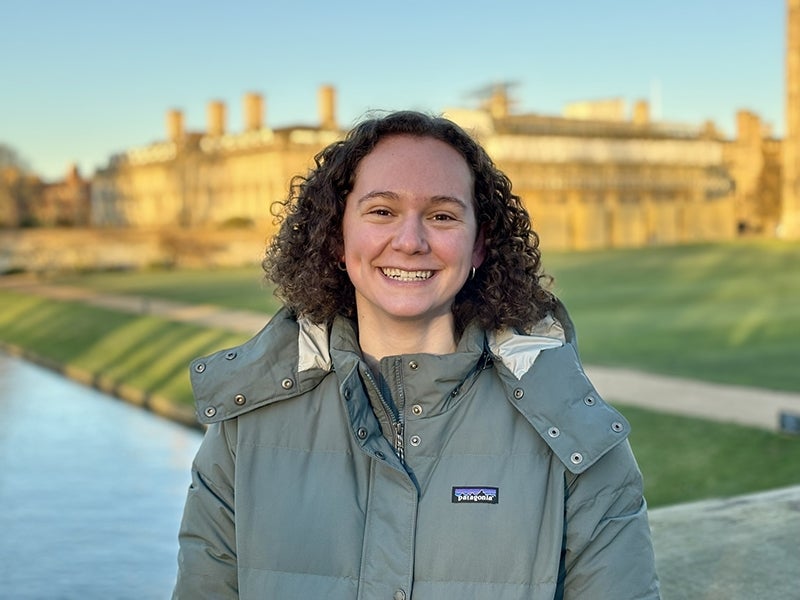
Shira Hoffer always wants to know what both sides would say.
“I think we get a fuller picture of humanity if we understand where others are coming from,” the Harvard College junior says. “When we listen to someone we disagree with, that doesn’t mean we have to change our minds. It just gives us more of a window into who they are and what shaped them. I think that’s inherently valuable.”
This persistent belief in the power of conversation inspired Hoffer to launch the Hotline for Israel/Palestine: a multipartisan texting hotline that provides transparent, dialogue-focused information about the conflict. Through text conversations, Hoffer and her team of volunteers share context, information, and resources from a range of perspectives, so that hotline users can understand the diversity of beliefs and develop their own informed viewpoints.
The idea for the hotline sparked when Hoffer messaged her House community soon after the October 7 attacks. With training through the student-led Harvard Mediation Program, experience fostering civil dialogue, and knowledge of the conflict’s history, Hoffer included her contact information with an open offer for conversation. She was surprised when several Housemates responded.
Hoffer soon realized that the need for reliable information and thoughtful discourse spread well beyond Cambridge. She officially launched the hotline in October and has since recruited 27 volunteers from five different countries and a range of backgrounds and religions. Together, they have texted with more than 350 people around the world. Her team has also launched “Perspectives,” an email digest that provides subscribers with content from different viewpoints on topics related to the conflict.
Harvard faculty across disciplines volunteered to help the hotline team compile diverse resources to share. Hoffer hadn’t met many of these professors until her hotline work began.
“I’ve been so heartened by professors’ support,” she says. “I really appreciate how much faculty care about the students and are willing to help them even outside of the classroom.”
In addition to her work on the hotline, Hoffer was inspired to launch a broader nonprofit, the Institute for Multipartisan Education. Through consulting and custom resource creation, the institute is helping classrooms across the U.S. foster respectful dialogue and improve the quality of curious and constructive disagreement.
“Our slogan is ‘disagree curiously,’” Hoffer says. “There is so much research to suggest that curiosity not only improves learning outcomes, but also reduces partisanship. It’s a mind-opening term that evokes images of kids looking through microscopes or seeing dinosaur skeletons. We need more of that love of learning in classrooms.”
In addition to consulting with several schools and colleges through the institute, Hoffer’s partnering with other discourse nonprofits to create public resources.
Many Harvard experiences have helped prepare Hoffer to lead in civil discourse. Last year, she served as an Intercollegiate Civil Disagreement Fellow with the Edmond & Lily Safra Center for Ethics. The program teaches a student cohort from five colleges and universities how to discuss controversial topics across political differences, then facilitate these respectful conversations on their campuses. Hoffer also served on Harvard’s Intellectual Vitality Committee, a group of students, faculty, and administrators who spent nearly two years studying civil discourse and academic vibrancy on campus. The committee was organized by Danoff Dean of Harvard College Rakesh Khurana and his team.
“The purpose of the committee was to find out how Harvard College, in its mission to find truth, can better encourage an environment of broad academic inquiry that’s still respectful, adheres to certain values, and is done with integrity,” Hoffer says.
Many of the committee’s final recommendations for first-year orientation, the curriculum, and teacher trainings are already being implemented. The College recently partnered with PEN America on staff and student leader workshops to foster dialogue. And this fall, civil discourse and grappling with counter arguments will be embedded in first-year Expos courses.
For Hoffer, her work in dialogue is only beginning. She’s eager to create more resources and grow the Institute for Multipartisan Education for an even greater impact. A joint concentrator in social studies and the comparative study of religion, she’s also planning for her senior thesis on speech and religious minorities in the classroom.
She says she’s found fulfillment directing the hotline, launching the institute, and making a tangible difference through dialogue. Hoffer hopes to continue her work in civil discourse and conflict resolution when she graduates from Harvard in 2025.
“In such a challenging time, it seems important to try and catalyze peace,” she says. “I think education and dialogue can really be those catalysts.”